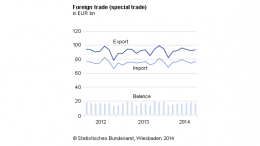Markets welcome Eurozone economic ‘bad news’
MADRID | By J. J. Fdez-Figares (LINK) | Stock markets face today a new week in which geopolitical conflicts, especially in Ukraine, and macroeconomic data that will be announced during the day will monopolize the attention of investors. Although we expect trading volumes remain low, typical of summer dates, we do expect a slight rise in volatility, especially given the current stage of confusion, both in the geopolitical and economic environment that financial markets are facing.





